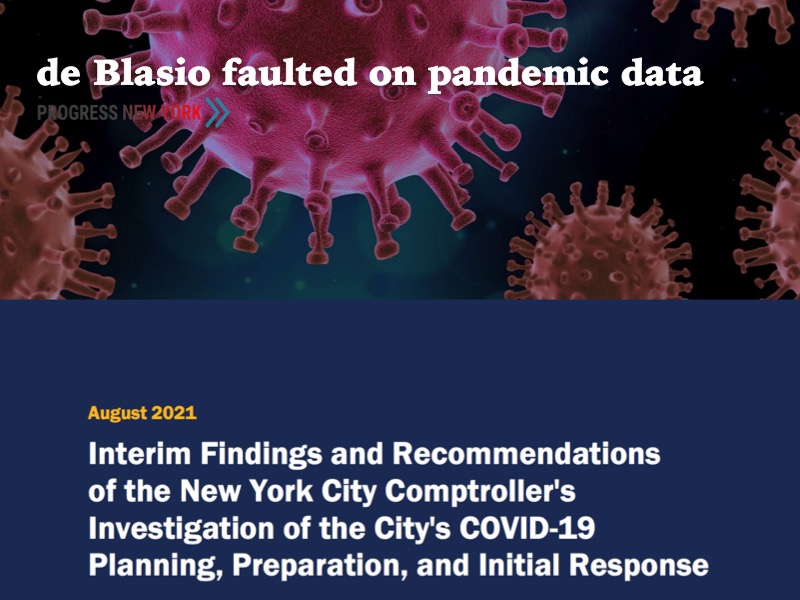Mayor Bill de Blasio was accused in a City audit of lacking pandemic preparedness, even as the de Blasio administration is moving the goal posts on the role of data in the pandemic response.
By Progress New York Staff
The administration of Mayor Bill de Blasio (WFP-New York City) stood accused of lacking planning and coördination to respond to the Coronavirus pandemic, according to an audit issued by the office of Comptroller Scott Stringer (D-New York City). The audit has been the subject of reports published by Bloomberg and Gothamist, amongst other news outlets.
The audit disclosed that the City Government spent $2.6 billion responding to the pandemic last fiscal year and has budgeted to spend $7.8 billion in pandemic response for the current fiscal year. In response to the audit, Mayor de Blasio said he had not read the audit and tried to blame Federal authorities. “None of us anticipated anything like this, and we needed Federal leadership that wasn’t there,” Mayor de Blasio said, according to the Bloomberg report about the audit.
The audit made interim findings, since the examination could not be completed. Comptroller Stringer’s audit revealed that the Mayor’s office and various agencies “have refused to provide all the documents and witnesses requested,” according to the Gothamist report. With the audit finding, in part, that “The City should improve its systems for collecting, managing, and disseminating critical data related to resources needed to respond to emergencies,” the questions over the City’s pandemic data continue to grow.
Nevertheless, Federal authorities with oversight powers to compel the disclosure of Government records have remained mum. The press office supporting U.S. Attorney Audrey Strauss, the top Federal prosecutor in Manhattan, did not answer a press inquiry for this report.
So @NYCMayor has now decided to just stop including the #Covid19 positivity rate in his tweets. It’s so blatantly corrupt it’s ridiculous.
How is there not more outrage about this guy? NYC has one of worst Covid responses in the entire world! https://t.co/YyFCA76uwH
— LongCovidNYC (@LongCovidNYC) August 17, 2021
For months, Progress New York has published reports, raising questions about the integrity of City health ministry data about Coronavirus variants, as well as whether the sources of COVID-19 testing, including home tests, were being proportionately represented in weekly variant sequencing studies.
For example, when Progress New York graphed the trend line of the ratio of the daily number of COVID-19 cases to hospitalisations that were reported as Mayor de Blasio’s daily pandemic indicators and shared on social media against the City health ministry’s corresponding data published on Github, there were observable divergences. The first divergence began to take place on or about a time when Progress New York reported about a delay in the release of pandemic data that, once cured, included a retroactive disclosure that the Delta variant had been detected in New York City for the first time. The second divergence has been taking place recently, as the City health ministry data has shown an extreme imbalance in the ratio.
It’s unknown what explains the disparities in the shapes of the compared trend lines. For this report, the press office supporting Mayor de Blasio refused to answer a press inquiry.
Even as questions have been raised about the City’s pandemic data, Mayor de Blasio decided to end consideration of the daily positivity rate for COVID-19 tests to inform public health policy. The pull-back came after the Delta variant became widespread in New York City. The highly-transmissible strain now accounts for 97 per cent. of sequenced COVID-19 cases, according to the most recent weekly variant sequencing study. The termination in considering the positivity rate followed a deliberate discouraging by the de Blasio administration of testing for vaccinated individuals, thus resulting in an altering of the population from whom sample sizes would be drawn for the weekly variant studies. Consequently, the integrity of City pandemic data continues to suffer.
At the same time, Mayor de Blasio has, like southern politicians, resisted issuing a public health order for compulsory indoor mask use. In response, some influential employers are telegraphing worries about the safety in congregating large numbers of workers in office buildings. For example, Twitter, Lyft, Asana, IBM, and others have decided to close their office or to keep them closed for the time being, including in New York City, revealing a lack of public confidence in the ability of the de Blasio administration to manage the Coronavirus pandemic.
To encourage increased social interaction in the face of the Delta variant outbreak, Mayor de Blasio has planned several large gatherings, including a concert scheduled for Saturday in Central Park.
In NYC, Mayor @BilldeBlasio is acting like a Republican Governor and openly letting #Covid19 spread.
There is no mask mandate.
No remote school option.
His vaccine mandate only requires ONE DOSE which isn’t enough to protect
And he’s hosting massive superspreader events
— Vaxxed AND Masked (@myrabatchelder) August 19, 2021
If we mandate vaccines for students & force them to attend school in-person, they can still get infected & pass it on to younger siblings & medically vulnerable family members. Why aren’t we grasping this concept? WHY are we forcing people to congregate during a pandemic?
— Laura Miers (@LauraMiers) August 19, 2021
Source Document
- Interim Findings and Recommendations of the City’s COVID-19 Planning, Preparation, and Initial Response [The Office of the New York City Comptroller]

